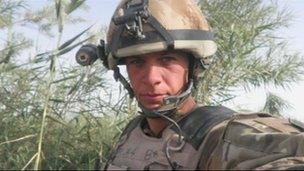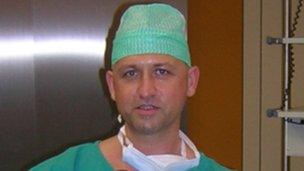Soldier Andrew Garthwaite's mind-control bionic op
- Published
As the first British serviceman injured in battle to use a new bionic arm, Cpl Andrew Garthwaite's story has already been remarkable.
But this week he underwent six hours of surgery at a hospital in Austria at the start of a process to make it even more so - to prepare him to be fitted with an arm he will be able to control with his brain.
The 24-year-old, from South Tyneside, was badly injured in Helmand, Afghanistan, in September 2010 when a Taliban rocket-propelled grenade took off his right arm and killed one of his comrades.
He first had to learn how to carry out everyday tasks with one arm but was delighted to learn he would have one of the latest models of bionic arms fitted.
He could hold a beer and do basic tasks. He could also perform his party trick - rotating his hand 360 degrees.
A technician then designed a new arm so he could ride his motorbike.
Rewire nervous system
He approached it all with a positive attitude and said his optimism was boosted by the support he had from his family, his friends and medics who saved his life.
This arm system, though, has its limitations and Cpl Garthwaite needs to flex his back or chest muscle to achieve a single, robotic movement.

Cpl Garthwaite was badly injured in September 2010
He was then deemed eligible for some remarkable surgery. It involved flying to Vienna, to have what the medics there called Targeted Muscle Reinnervation (TMR), the first step on the process to receiving the arm he will control with his mind.
Speaking before he went, he said: "I'm really excited at going over. A little bit nervous but I think the outcome is going to be great."
The surgeons at the hospital in the Medical University of Vienna have rewired his nervous system.
He is believed to be the first person from the UK to undergo this cutting-edge technique in the field of bionics.
Cpl Garthwaite said he had been "lost for words" when he learnt that and was "honoured" to have been chosen.
'Difficult surgery'
Surgeons at the hospital are working closely with bionics company Otto Bock, in Vienna, to create one of the most intelligent bionic systems in the world.
In an operation lasting six hours on Tuesday surgeon Prof Oskar Aszmann and his team worked out which of the mass of tiny nerves from his shoulder joint operated his arm and hand. Once they isolated those, they rewired them into his chest.
After the surgery, Prof Aszmann said: "It all went extremely well.
"It was a surprise to me because he had a shrapnel injury, there was a rocket wound, so normally you have to expect a lot of scar tissue, but it was not the case.
"It was a difficult surgery, but we could identify all the nerves that we wanted to and transfer them to the appropriate targets."
In the coming months these nerves will grow. Cpl Garthwaite's mind will work out which nerves do what, and will learn how to control those nerves.
He will then be able to control his bionic arm in such a way that it will become intuitive, unlike the slow robotic movements of his current arm.

Prof Aszmann said the surgery went "extremely well"
He will be able to think several moves and his arm and hand will react naturally. His bionic arm will be thought-controlled.
'Exciting prospect'
After his complex, remarkable surgery, Cpl Garthwaite will soon feel a hand on his chest, his own hand.
And, as the nerve endings grow he too will be able to operate his bionic limb by simply thinking about those hand and arm movements.
Prof Aszmann said: "For the first four to five months he will be very numb and not feel anything, but after around six months, he will feel his own index finger and thumb in his shoulder, so when he pinches his shoulder he will say 'oh this is my index finger or here's my thumb'.
"That's really exciting because, in the future we will have little senses in these artificial fingers and they will have direct sensory feedback."
Before the surgery, Cpl Garthwaite said he was excited at the prospect of having a more natural arm movement and being able to use it quickly rather than the slow process it can be currently and even the possibility of being able to feel hot and cold.
He said: "I still have my down days and I still have flashbacks and memories, which will never leave us, but you just learn to crack on.
"With this new target I have got to hit now, it is keeping my mind occupied.
"You just want to look into the future and just think what's actually going to happen, how much it's going to benefit me."
See more in Look North on BBC1 in the North East and Cumbria on Wednesday 25 January at 18:30.
- Published10 November 2010